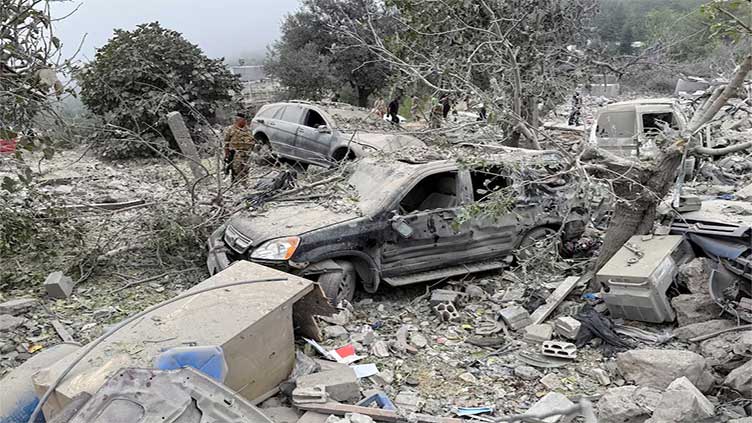US says it opposes scope of Israeli air strikes in Beirut

World
The US had expressed its concerns to Prime Minister Netanyahu's administration on the recent strikes
WASHINGTON/BEIRUT (Reuters) – The United States, Israel's closest ally, on Tuesday said it opposed the scope of the country's air strikes in Beirut over the past few weeks amid a rising death toll and fears of wider escalation involving Iran.
Israeli military evacuation orders were also affecting more than a quarter of Lebanon, according to the UN refugee agency, two weeks after Israel began incursions into the south of the country that it says are aimed at pushing back Hezbollah.
Some Western countries have been pushing for a ceasefire between the two neighbours, as well as in Gaza, though the United States says it continues to support Israel and was sending an anti-missile system and troops.
On Tuesday, State Department spokesperson Matthew Miller said the US had expressed its concerns to Prime Minister Benjamin Netanyahu's administration on the recent strikes.
"When it comes to the scope and nature of the bombing campaign that we saw in Beirut over the past few weeks, it's something that we made clear to the government of Israel we had concerns with and we were opposed to," he told reporters, adopting a harsher tone than Washington has taken so far.
Separately, Secretary of State Antony Blinken and Pentagon chief Lloyd Austin wrote to Israeli officials on Sunday demanding concrete measures to address the worsening situation in Gaza and telling them to take specific actions within 30 days, US officials said.
Israel has been turning up the heat on Hezbollah since it began incursions into Lebanon after killing Hezbollah leaders and commanders, including its veteran secretary-general Hassan Nasrallah last month in the biggest blow to the group in decades.
On Tuesday, Netanyahu told President Emmanuel Macron of France during a phone conversation that he opposed a unilateral ceasefire and said he was "taken aback" by Macron’s plan to hold a conference on Lebanon, according to an Israeli readout.
"A reminder to the French President: It was not a UN decision that established the State of Israel but the victory that was achieved in the War of Independence..," Netanyahu's office said in a separate statement.
The Elysee Palace did not immediately respond to a request for comment. The pair have previously clashed, including over Macron's call to halt arm sales to Israel.
PAIN AND CEASEFIRE
With diplomatic efforts stalled, the fighting continues.
The Israeli military said on Tuesday it had captured three members of Hezbollah's elite Radwan forces, adding that they had been moved to Israel for investigation. Hezbollah has not commented.
Its deputy chief Naim Qassem said earlier on Tuesday the Iran-backed group would inflict "pain" on Israel but he also called for a ceasefire.
"After the ceasefire, according to an indirect agreement, the settlers would return to the north and other steps will be drawn up," Qassem said in a recorded speech.
There was no immediate comment from Israel, which says its operation in Lebanon aims to secure the return of tens of thousands of residents forced to flee their homes in northern Israel because of Hezbollah attacks.
Qassem said more Israelis will be displaced and "hundreds of thousands, even more than two million, will be in danger at any time, at any hour, on any day".
Israeli strikes have killed at least 2,350 people over the last year and left nearly 11,000 wounded, according to the Lebanese health ministry, and more than 1.2 million people have been displaced.
The toll does not distinguish between civilians and combatants but includes hundreds of women and children.
The health ministry said 41 people were killed and 124 were wounded on Monday. Around 50 Israelis, both soldiers and civilians, have been killed since fighting began, according to Israel.
The figures underscore the heavy price Lebanese are paying as Israel tries to destroy the Iran-backed militant group’s infrastructure in their conflict, which resumed a year ago when it began firing rockets at Israel in support of Hamas at the start of the Gaza war.
EVACUATION ORDERS
The UN refugee agency's Middle East director, Rema Jamous Imseis, said Israeli repeated evacuation orders to scores of villages in southern Lebanon meant over a quarter of the country was now affected.
"People are heeding these calls to evacuate, and they're fleeing with almost nothing," she told a briefing in Geneva.
Israel expanded its bombing campaign in Lebanon on Monday, killing at least 22 people in a strike in the north on a house where displaced people were sheltering, health officials said.
Many were women and children from the same family.
UN human rights office spokesperson Jeremy Laurence called for an investigation into the strike which he said has raised concerns with respect to "the laws of war".
Israel has not commented on the strike, but says it takes all possible precautions to avoid civilian casualties.
The main focus of Israel's military operations in Lebanon has been in the Bekaa Valley in the east, the suburbs of Beirut and in the south, where UN peacekeepers say Israeli fire has hit their bases on numerous occasions and wounded peacekeepers.


